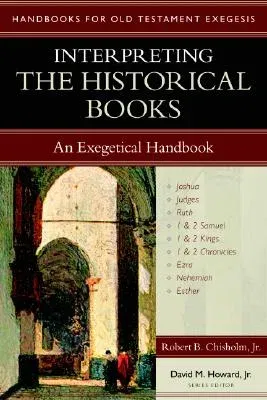The Old Testament displays a remarkable literary and theological unity
through a variety of genres. But applying a single, one-size-fits-all
method of exegesis can lead to confusion and misunderstanding. A
valuable reference tool for students and pastors, the Handbooks for Old
Testament Exegesis (HOTE) series provides readers with an enhanced
understanding of different Old Testament genres and strategies for
interpretation. The inaugural volume in the HOTE series, Interpreting
the Historical Books begins by exploring the components of
narrative-setting, characterization, and plot-and then develops the
major theological themes in each of the Old Testament historical books
(Joshua, Judges, Ruth, 1-2 Samuel, 1-2 Kings, 1-2 Chronicles, Ezra,
Nehemiah, and Esther). As readers work through Interpreting the
Historical Books, they will begin to see and interpret the narrative
writings as the writings were intended to be understood. A glossary
defining technical words and samples of moving from exegesis to
proclamation make this handbook practical and user-friendly. All written
by accomplished teacher-scholars at leading evangelical schools,
forthcoming handbooks include the following: Interpreting the Psalms
Mark D. Futato (Reformed Theological Seminary, Orlando) Interpreting the
Prophets Michael A. Grisanti (The Master's Seminary) Interpreting the
Wisdom Literature Richard L. Schultz (Wheaton College) Interpreting
Apocalyptic Literature Richard A. Taylor (Dallas Theological Seminary)
Interpreting the Pentateuch Peter T. Vogt (Bethel Seminary)

